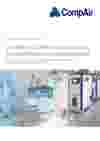Reach Out to Us
Pharmaceutical production of the future: Increasing quality and reducing operating costs with innovative design approaches
The pharmaceutical industry is one of the most strictly regulated industries in the world. Anyone wishing to manufacture medicines must abide by ‚Good Manufacturing Practice‘ (GMP1) guidelines, the European Pharmacopoeia2 , various guidelines from the FDA (Food and Drug Administration), and recommendations from the ICH3 (International Council for Harmonisation of Technical Requirements for Pharmaceuticals for Human Use).
Why air is not always air
Any form of compressed air will contain particles of contaminants. These can stop a pneumatic system from functioning as it should and may lead to production quality issues. These will tend to occur if the process air comes into contact with the product. Various types of contaminant are possible, with the ambient air or intake air susceptible to contamination with almost any kind of particle insert including pollen, dust, hydrocarbons, or heavy metals such as lead, cadmium, or mercury. DIN EN ISO and EU GMP guidelines define, based on cleanroom classes [Fig. 1], how many and what size of particles may be present in a given room. No account is taken of how particle concentrations in the compressor increase significantly when compressed air is generated. During blow-off from a pneumatic system, there may (though not necessarily) be direct contact with the product. And this may result in contamination of formulas due to the extremely high particle density involved.

The potentially critical importance of compressed air applications and the impact the compressor that actually generates the air can have are illustrated by the questions below:
- Does the compressed air application involve direct or indirect contact with products?
- What volumes of compressed air are involved?
- Is the manufactured product a sterile medicine or is it microbiologically unstable?
- Are other contaminants (particles, oil) normally associated with compressed air of particular significance in relation to the medicine?
- Is the product sensitive to moisture?

More efficiency at less cost - you'll love it
Today, it is not only purchasing that can and should save money! You as an industrial pharmacist in pharmaceutical production can also make your contribution to greater efficiency. But not at the expense of quality! This white paper delivers constructive solutions for more compressed air purity with oil-free compressors. It also explains how you can raise your production standards with a new generation of oil-free compressors and significantly reduce operating costs at the same time. Curious, click the link to download it?

PureAir compressors
CompAir offers a comprehensive range of oil-free, pure air compressors that meet the highest quality standards and deliver outstanding efficiency, from the DH range to pioneering Ultima technology. Countless companies around the world already rely on our oil-free technology. All PureAir compressors are Class 0 certified and 100% silicone free, please watch this video to learn more & watch our oil-free models in action:
This white paper takes a more detailed look at the topic of (sterile) compressed air generation and shows the potential offered by oil-free compressors for pharmaceutical processes. The construction and design of modern oil-free compressors is discussed and the impact they can have on things like the total cost of ownership in the manufacture of medicines. Other aspects dealt with by the white paper are the energy efficiency of these oil-free systems and how they can help reduce operating costs within a business.

Water Injected Oil Free Rotary Screw Compressors
D15H (RS) to D37H
Pressure: 5 to 10 bar
Flow: 0.32 to 5.86m3/min
15 to 37kW
Single-stage, oil-free water-injected screw compressors, fixed or regulated speed, silicone free and ISO-8573 Class Zero (2010) certified oil-free screw compressors

Two stage oil free rotary screw air compressors
DX90 (RS) to DX160 (RS)
Pressure: 4 to 10.5 bar
Flow: 6.7 to 28.3m3/min
90 to 160kW
Two-stage, oil-free screw compressors, fixed or regulated speed, silicone free and ISO-8573 Class Zero (2010) certified oil-free screw compressors

Oil Free Screw Compressors
Ultima Series
Pressure: 4 to 10 bar
Flow: 4.4 to 24m3/min
55 to 160kW
DOWNLOADS
INNOVATIVE, OIL-FREE COMPRESSED AIR SOLUTIONS FOR THE PHARMACEUTICAL INDUSTRY
INNOVATIVE, OIL-FREE COMPRESSED AIR SOLUTIONS FOR THE PHARMACEUTICAL INDUSTRY
Innovative, oil-free compressed air solutions for the pharmaceutical industry
Innovative, oil-free compressed air solutions for the pharmaceutical industry
Fresenius Kabi a global leader in Healthcare
CompAir Ultima oil-free air compressors are used by Fresenius Kabi, a global leader in Healthcare, specializing in the production of life saving medicines and technologies, where completely pure air is required in their production line manufacturing process.

